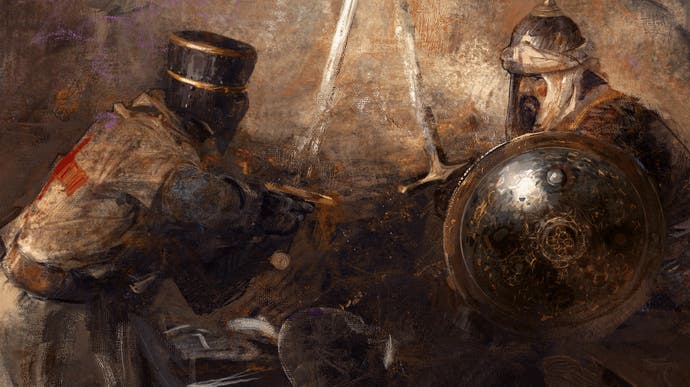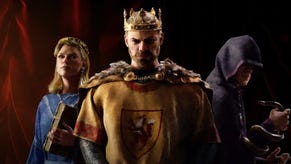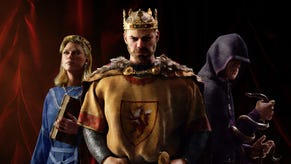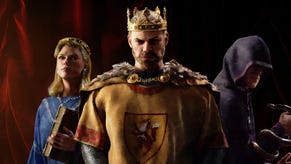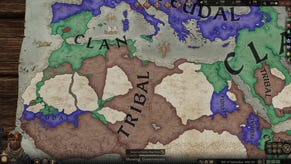Playing Crusader Kings 3 on console: a bit unwieldy but it works
Historical friction.
I'm trying to unite Ireland. It's 1066. Harold is about to get shot in the eye over in England - I know that because of history - so I've snuck in early and befriended him, and arranged for my daughter to marry one of his sons when she comes of age. Icky, I know, but when the French later decide to help my Irish neighbour in a war against me, and turn up in their thousands, I'm able to call on the English to fight them off. Step by step, I'm getting there.
This is Crusader Kings 3, and I've wanted to play Crusader Kings 3 for a long time. I've tried playing on PC before but bounced off it. Why it's taken until the console release to try again, I don't know, but here I am. And now the question is whether, on console, it works. The answer? Sort of.
It's a port with some adaptation; it's not a complete rethink for consoles. The game you might already know has been squeezed onto a gamepad and slightly enlarged for TV, and though it never quite feels natural, it works well enough to play.
You can, for instance, activate a cursor by clicking-in the left stick and using it to hover over tooltips for additional information, but it's awkward and slow. It's clearly a PC thing shoehorned onto consoles rather than being properly rethought.
But there are now radial menus which appear with sustained left or right trigger pulls, and bring up various map overlays or character skill trees and things like that - non-essential menus, I'd say. And then quicker trigger-pulls cycle you through more commonly used menus at the top of the screen, with bumper presses taking you through menus within them. There are a lot of menus as you can see. Really, this is a game about menus. And while everything has been made pad-accessible, sometimes it's a bit fiddly getting there.
One control that works particularly well, though, is pausing and speeding up time, which is mapped to the touchpad in the middle of the DualSense controller. Pressing it pauses the game, which you'll do a lot, while swiping left or right slows or speeds up time accordingly. It's great.
What is less great is window management. Closing windows (with B or O) is particularly annoying, as often I need to close windows I want to keep open in order to get back to the ones I don't. Browsing through marriage prospects is an example of where this gets frustrating, because I can't keep all the information I want on the screen without having to go back every time and open the relevant windows again. And every step of extra faff adds up in a micro-management game like this.
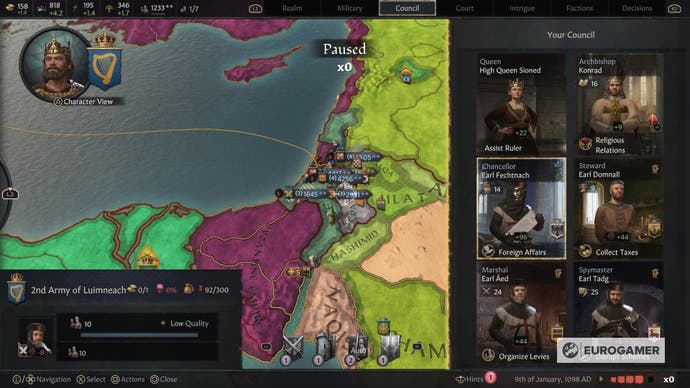
But though it can feel a bit awkward, Crusader Kings 3 otherwise runs very well on PS5 for me. Loading times are zippy, which is something porting house Lab42 promised, and I haven't noticed any simulation slowdown when things get busy. There's even a bit of haptic feedback on PS5, on the triggers, apparently to represent your ruler's current stress level. You wouldn't know that if you hadn't read about it, though. In play, it just feels like odd moments of resistance.
All of this means I've finally persevered with Crusader Kings 3. I've soldiered on through the horrible tutorial, which is just an endless barrage of tooltips, more akin to reading a manual than playing a game. And I've made it through those wobbly first years of rule. Now, I'm fairly comfortable, and I can see how easy it is to lose entire afternoons to messing with history.
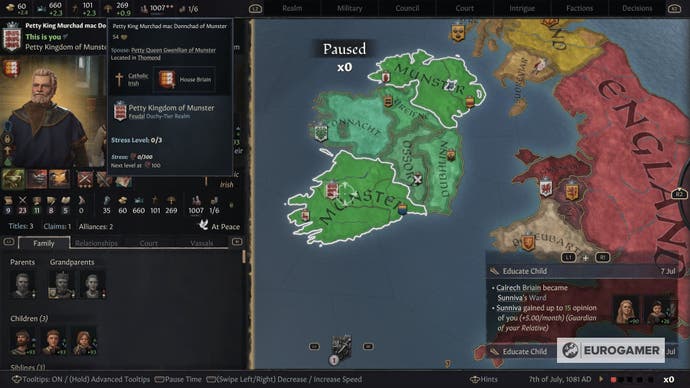
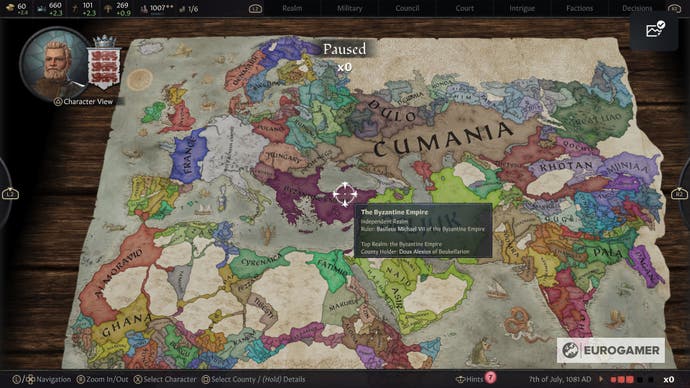
Key to getting to this point have been a couple of things. One is auto military control: you can hand over all military manoeuvres to the computer. You still declare the wars, it's just that the AI then raises your armies and marches them to where they need to be to fight them, which is both a great help and a huge time saver, freeing you up to think about other things (combat isn't as involved as in, say, Total War, anyway - armies fight each other automatically).
The other thing that's enormously helpful are Hints. Pushing the right stick in brings up a list of things the game suggests you could do, which changes as you play. You could marry-off one of your children or subjects, for instance, or appoint people to your council, or maybe ransom a prisoner. It's a really useful way of not missing important things that are going on, and of giving you ideas in quiet moments. It's quite possible to play the game almost entirely from this menu if you like.
With the help of these things, I've now united Ireland and crowned myself king, and even been invited by the Pope (rather forcefully) to join a dramatic holy crusade to the Middle-East. This is Crusader Kings after all.
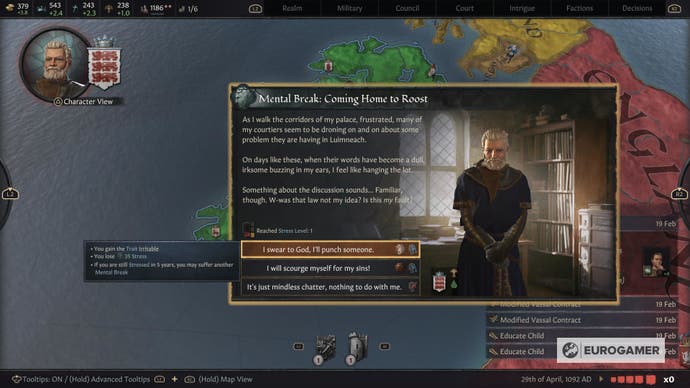
I've experienced the loss of a ruler and switched to one of his offspring, and then seen what it looks like when a half-brother raises his own claim to my throne. I even accidentally decided to play as the commander I sent to the Middle-East and strike out as a ruler there, converting to the local religion before rightly being turfed out by people who didn't want me to rule them. Changing character shifts the perspective of the game dramatically - it's a great feature.
In other words, I've seen some of the juicy drama Crusader Kings 3 offers. I've pledged my love to someone other than my wife while throwing others in prison for their adultery. I've embarked on murderous plots and ousted backstabbers and would-be challenges to my throne. I've risked experimental surgeries to keep myself alive. This is a game that consistently finds fun little scenarios to keep you busy and keep you thinking. It's a game that finds success in making history human and fun.
Sometimes it's a tricky game to want to play, though. I'm endlessly enticed by the idea of righting the wrongs of history but less so about reenacting the problematic parts of it, like holy crusades or violently taking territory I decide ought to be mine - especially given what's going on in the world today. In many ways, Crusader Kings 3 serves as a bloody reminder of where many of our worldly problems come from. And while some of it seems changeable, like male-only succession and elected rulers, possibly, expansionism seems to fundamentally be the point of the game.
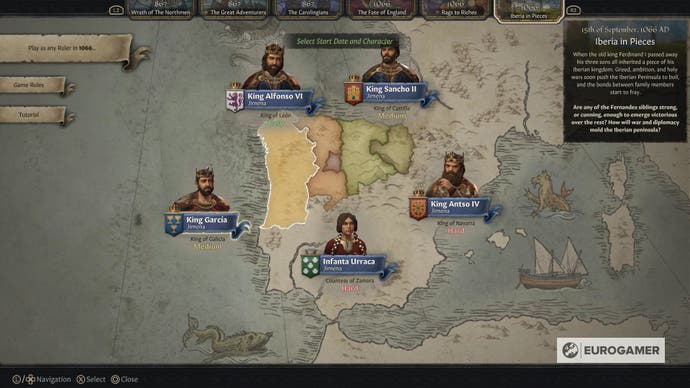
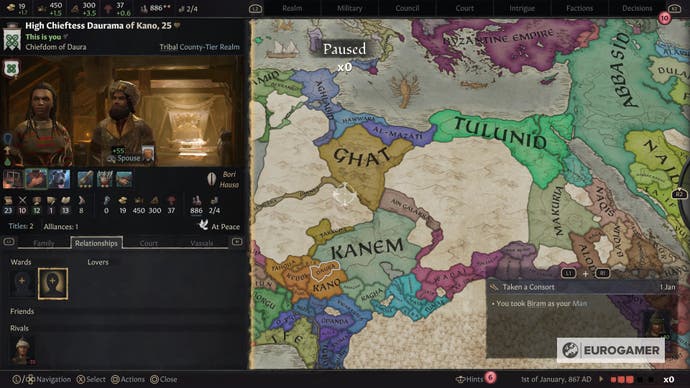
But our history isn't really the game's fault, it's just sometimes hard to enjoy when you feel the game revelling in it (I am no fan of presumably period-themed traits like "homely" for unattractive women and "lunatic" for people with mental illnesses). And sometimes it's unclear where the game stands on it all.
Nevertheless, I feel the pull. This is a historical simulation with a lot of charm, and with the aid of the AI, and a bit of perseverance, it's a surprisingly breezy way to while away an evening or afternoon.
